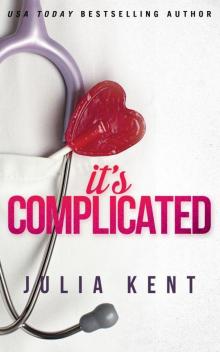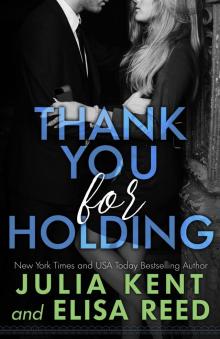- Home
- Julia Kent
Hasty (Do-Over Book 4) Page 6
Hasty (Do-Over Book 4) Read online
Page 6
Mom gives me a wide-eyed look designed to paralyze me. “Hastings,” she hisses.
“What? I’m putting in an order.”
“I don’t think you’re ordering the same thing we are,” Mal says under her breath.
“You’ve got a fiancé and I’ve got a court date, so you do you and I’ll do me.”
“I think you’re trying to do Pedro.”
Mom looks at Pedro. “I will do the daily special. Chicken soft tacos.”
“Mom!” Mallory practically screams. “Never soft taco. You never go soft taco.”
Pedro’s eyes jump from Mom to Mallory. Mine, meanwhile, are pinned to the ceiling. “Mom,” I say, laying a hand on her elbow, “Mallory’s right.”
They both freeze.
“I am?” Mal gasps.
“Soft tacos are an abomination.” I turn to Pedro. “I’ll take three crispy tacos with cubed chicken, lettuce and tomato, shredded cheese, sour cream, guacamole, and mild salsa on the side. Green salsa, actually.” I change my mind at the last second.
“That’s my order!” Mal says.
“It’s not the order,” I explain to her. “It’s the ratio.”
Her mouth goes into a perfect O. My sister looks like a blow-up doll.
Mom closes her eyes slowly. “You, too, Hasty?” she whispers.
“Me, too–what?”
“Two Crazy Mals comin’ up!” Pedro shouts to the back, where workers wearing plastic hair caps and gloves start moving fast.
I look at Mallory. She shrugs.
“That’s what Pedro calls my order.” She looks at me uncertainly. “Do you… do you eat yours with peanut butter?”
“Peanut butter?”
“I know, it sounds really weird, but Fletch—oh, never mind.”
Mom hands her credit card over to Pedro, who eyes me as if my chest is a glass screen and he’s swiping right nonstop.
“You in town for long?” he asks.
“I’m in town forever.” Feels like it, anyway.
“If you ever get bored, or you just want, you know, some good meat, come on by.”
“I’ll keep that in mind.”
“She’s married!” Mom interrupts.
He shrugs. “That never stopped me before, Sharon.”
“Pedro! Does your father know that you—”
“Mom, I’m not married. Remember?” I interrupt her.
A lightbulb goes on in Pedro’s eyes. “Wait a minute.” He looks at Mallory, Mom, then me. “Monahan. You’re Hastings Monahan, the one that’s all over the news! I never made the connection before. Oh, man, I am so sorry.”
What had been naked self-interest, with an emphasis on the naked part, suddenly becomes pity.
Pity eyes are a tool of the devil.
I walk down to the order pickup section, ignoring him. Mallory’s on my heels. We get to the end, where I start tapping my toe.
“I’m sorry,” she whispers.
“About what? Mom’s soft tacos?”
“Oh, no. I am sorry about that, but no. I mean, I’m sorry about Pedro.”
“It’s fine. I get that a lot. I got it back home—” I correct myself. “California,” I say, emphasizing the word with my body: hands out, palms up in supplication.
“It’s not like you came back here a lot. I mean, people remember you, but—”
“Hastings!” Amelia Wissen walks up to us. “Oh, my goodness! I heard about what happened to you. I am so sorry.”
I accept her pity hug.
There’s no pity in Mallory's expression as she watches us, thank God. There may even be a dawning understanding of what the last month of my life has been like. Empathy was always Mallory's strong suit, and it made me view her as weak.
With brains, no ambition, and piles of empathy, how did she even function?
The comfort I feel in her presence is making me rethink everything I know.
“Amelia! So good to see you. I think I heard you’re running a preschool?”
“Oh, I do that on the side. It’s my grandmother’s foundation. I’m actually the director of a nonprofit that brings injured children over to the United States for reconstructive surgery after they lose a limb from a land mine.”
High-quality global philanthropy in that narrow a niche? I don’t know what to say. I'm speechless.
I just stare at her. Nervousness kicks in and she says:
“It started with a simple donation and went from there when—well, it’s a long story.”
“I’m curious. Really.”
“Oh!” She seems surprised that I would be interested. “I saw a GoFundMe for someone who had adopted a child who had lost a limb, and the reconstructive surgery was going to be expensive to help this child have the best chance to walk, and I donated and learned more, found out about the success, and… I don’t know how to explain it.”
“You’ve always loved children,” Mallory says, smiling at Amelia and giving her a quick hug.
“Can’t be on the board of a preschool and not.”
“And you’re a mother,” Mallory adds.
“Yes.”
“How many kids?” I ask, knowing how this works. Most of the women my age, at my level–well, former level–of business, don't have kids. Yet. Like me, they engaged in egg retrieval and freezing in their early twenties. Late thirties, at best, is when I'll be ready to...
Right.
Damn.
All of my plans dissolved when they arrested me.
Amelia's joyful grin shakes me out of my thoughts. “I have two. They’re four and three. What about you, Hastings? Do you have kids?”
“No.”
“And—oh, right.”
The way she closes off is a reminder that–oh, right.
I have no life.
From behind the counter, someone calls out her name. She turns and looks at the tray. “I’ll see you around!”
“Okay. Bye.”
Shallow encounters used to be my forte. It was part of how I networked, the social glue of connection being a way to make money, to gain power, to have influence, to matter.
None of that works here, at least not the way that it did in the Bay Area.
It especially doesn’t work now, because I am radioactive.
What do you do with radioactive waste? You contain it. You let it sit and sit and sit until it degrades, but it takes thousands of years.
I don’t have thousands of years, and I certainly don’t want to be contained.
“Sharon!” calls someone from behind the counter.
I look over. Our trays are there, Mallory staring at me with concern.
“What?” I grab my tray and move.
She takes hers, Mom appears, and the three of us head for an open table as Mallory starts talking to me.
“You’re going to experience that over and over. It’s not going to stop until some other scandal kicks in.”
“How would you know?”
“Because I went through it when I was caught on that porn set. And Perky went through it when her two-dogs-humping picture was everywhere. Fiona went through it when she had to disable the attacker in her preschool classroom. It’s how this works.”
“It’s not my fault Burke did what he did.”
“Fault doesn’t matter, Hasty.”
“Stop it. Call me Hastings.”
“Fine. Hastings. Fault doesn’t matter. You know that.”
Fault doesn’t matter.
“What matters is keeping your head down.”
Mom takes the chair to my right, Mallory sits across from me. Like a mirror image of myself, she shifts the position of everything on her tray: the sour cream, the salsa, the guacamole. A separate knife for each one. The tacos themselves set up just right.
As we organize our ratios to be perfect, a little voice starts whispering in my head. When did Mallory and I ever have something in common?
“You, too?” Mom moans, looking at my carefully assembled tray. “Can’t you just eat tacos?
”
“That would be a waste,” we say in unison.
Mallory jolts, eyes wide, a curl bouncing over her eyebrow. “When did you—”
“When did you?”
“Really? All this time?”
“Maybe you learned it from me,” I tell her. “This is just another one of those annoying little sister things, where you watched me create the perfect ratio and then you decided that you were going to be just like me, and—”
“No! We never ate here together during my formative years, when I was learning how important the ratio was. By the time this place opened, you were gone. You came here for my wedding dress fitting, but other than that, no.”
Mom purses her mouth, fingertip touching her lips, tapping slowly. “You know, Mallory’s right. Dad and I have never taken you both here at the same time. Maybe it’s a genetic thing, a recessive gene that skipped right past your father and me, but when we conceived you, it just—”
“Mom! Stop! Stop! We don’t wanna hear about our conceptions when we’re staring at sour cream, of all things!”
Mallory’s words make me choke. Mom starts banging on my back with a closed fist while Mal shoves a glass of water at me. I sip it, laugh-choking. Water shoots up into my sinuses, and now I’m burning, choking, and laughing at the same time.
The very same body that doesn’t feel anything, suddenly feels too much.
It takes longer than it should for me to calm down, but when I finally do, my throat is raw and ragged as I say, “Natural selection is at play, Mom. We’re making a species shift, like going from Neanderthals to humans.”
“How can you eat soft tacos like that? How can you not take into account the ratio, the mouth feel, the macronutrients?” We turn toward the man’s enquiring voice to find Chris Fletcher standing there, holding a takeout bag, grinning at our mother as his words sink in.
“Fletch!” Mallory says.
Mom turns around. “Christopher! Good to see you.”
“Good to see you, too, Mrs. Mon—I mean, Sharon.”
“Nice catch,” she says. “What’re you doing here?”
He holds up his bag. “Loading up on macronutrients.”
“Aren’t you worried the taco shells will be too damp by the time you get home?” Mallory asks, mirroring my thoughts exactly.
“That’s why I gotta go. Just wanted to say hi.” His eyes meet mine. “Hey, Hasty. Hope things are going well. See ya.” He takes off.
The use of my nickname, the one that I didn’t pick, one that was imposed on me by the apparently irresistible human need to stick a y on the end of a dignified adult name and thereby reduce its owner to toddlerhood, makes me bare fangs I don’t possess.
“You really hate that,” Mom says to me.
“I hate when hard-shell tacos get damp,” Mallory says as she carefully assembles her sour cream, her guacamole, and her salsa on the edge of her taco shell. Her technique is exceptional.
I’m viewing my sister through a new lens.
“I do. Hasty is a stupid nickname. Hasty rhymes with pasty.”
“That’s a little porny,” Mal says.
I glare at her.
“Hasty rhymes with tasty,” Mom says.
“Tasty Pasty. That sounds like a porn name.”
“Mallory,” Mom chides her. But her eyes float up to the ceiling, as if she’s thinking. “Hmm. Basty, daisty, faisty, gaisty, hasty, jaisty, kaisty…”
“Mom, what are you doing?”
“I’m running through the alphabet to see all of the words that rhyme with Hasty. Maisty, nais—nasty, pasty, sais—”
“You forgot q.”
“Quaisty? That doesn’t work.”
“As if any of the other ones do?”
“Tasty, vaisty, waisty, yaisty—”
“That’s a little too close to yeasty.”
“And zaisty. Hmm. Nope. Tasty Pasty Hasty it is.”
“You’ve just found an even worse nickname that has absolutely nothing to do with Hastings.”
“Well, I’m Fluffy,” Mallory jokes.
“Can we just focus on the ratio? Let's ignore Mom, but you and me–” I gesture across the table, waving in the air between us “–can we just eat in peace? Because you’re ruining my taco nirvana.”
There’s that O face again from my sister.
“You call it that, too?”
“I called it that first.”
Anger sparks between us. Perhaps the sparks are from my teeth grinding together like two pieces of flint. I don't know why I'm suddenly livid. I can feel my pulse pounding in my hands, Mallory an easy target, low-hanging fruit I need to pluck. It's not fair. I know that.
But emotions are never fair.
Studying me like I'm her dissertation project, Mallory takes her time, watching as I munch on my perfectly layered taco, before finally saying, “You look tired.”
“Mnx,” I mumble through my mouthful.
“No,” Mom interrupts. “She looks depressed.”
“Urf?”
Great. Now I sound like Scooby Doo.
I swallow long before I'm ready and regret it immediately.
Mal adds, “I'd be tired, too, if I were you. And depressed. I can't imagine Will doing to me what Burke did to you.”
I didn't know that pity was one of the sides that come with your lunch here at Taco Cubed. Didn't order any of that from the menu.
Especially not the extra-large size.
“I am fine,” I inform them. “I'm not in a jail cell. No civil suits. Paparazzi aren't chasing me, much. I was allowed to keep five whole pairs of shoes. I,” I say through the appalling tear storm that hits me, “am just fine.”
I sob.
“Shit,” Mom mutters under her breath, which makes me realize just how far gone they all think I am, because when Sharon Monahan utters a dirty word like that, you're a lost cause.
Mallory hands me a paper napkin for my tears. I use it. I take a deep breath, the scent of cumin and fresh tomatoes giving me life.
Enough with depression.
I’m done.
I did not attend an expensive Hawaiian retreat with one of the best motivational speakers in the world–a guy who appeared on Oprah numerous times–just to let myself wallow like I have since I got home. I’ve run a hundred and seventy-two miles, cleaned my bedroom at least twice, taken seventeen bags of old clothes to Goodwill, and organized the shelves in Dad’s garage to the point of being banished from his workshop refuge.
It's time to get my act together.
“I’ve got to look for a job.”
“Do you want some help?” Mal asks gently. “Will could–”
“No. Thank you.” Gratitude was never, ever my strong suit, so this feels awkward, like stretching a too-tight bra over a too-big chest. I do it anyway, because it's all I've got. “I–I appreciate it.”
Mom and Mal stare at me, leaving space for my words, open swaths, football fields of space. I'm drowning in my own feelings, arms flailing, begging for help to get to shore, to stop swimming in these dangerous waters.
Emotional oceans are so, so deep.
“We're here for you,” Mom and Mal say in unison, making me feel like I'm not even related to them, as if my DNA splintered off somehow, the branch my development took so distant that I'm another species.
My hand goes to my heart. “This… my...” I stutter, fighting to find words.
“That's called your heart, Hasty,” Mallory says, making me laugh.
But when I look at her, she's completely serious.
In the days and weeks after my arrest, as the details about Burke slowly unfolded, and especially as my assets were seized, I came to realize that everything was gone. Our cars were taken away. Our homes were taken away. Every bank account was frozen. And who carries cash these days?
I was left with seventeen US dollars in random bills and coins in my purse, a fifty-Euro note and a handful of pounds in coin from the UK, a Nordstrom’s gift card with three hundred and th
irty-seven dollars left on it that was given to me by someone at my firm for some reason I don't remember, and that was it.
That was all the money in the world I had access to after the accounts were shut down. Somehow, the Feds let me have $700, which I used to get a secured credit card. That's it.
I still have the Nordstrom’s gift card and the foreign currency. It’s my emergency backup.
A mix-up, I'd assumed at first. Being the victim of a computer glitch was actually easier to fathom than the truth. Of course, I'd assumed, in a couple of days, I’d have access to all the money I'd carefully accumulated with my husband, right?
My money?
But as interrogators sat across from me in rooms with twitching fluorescent lights that made everything seem so much more gravid, reality intruded. Invaded.
Conquered.
I was a chump. A sucker. A mark.
What I had thought was my money was just an illusion.
Here’s the issue with being a scandal: No one who has assets wants to talk to you. The only people who call are the gossip mongers. The ones with no real power. I gained the attention of the pettiest people in my social circle, the ones I had only tolerated because they had some connection to the people who actually do things.
But when the people who actually do things want nothing to do with you, what do you do?
You come home. You stare at your Lisa Frank posters. You run ten miles a day. Sometimes twice a day.
And you cry over a taco while your mother and sister give you pity eyes.
Then you go home and job search.
After eating the perfect ratio, of course.
And letting them group-hug you until the crushing weight of failure is just a tiny bit lighter.
The last time I drafted a resume for myself was last year, for HR files at the venture capital firm I work for.
Worked for.
Boston is rife with companies I can approach, but here’s the other little problem with having been arrested on RICO charges and being married—but not married—to the biggest financial con artist in American history.
No one wants me anywhere near their computer system.
No one wants me in their office.
They don’t even want me applying.
Funny, that.
I am persona non grata. Even when I recreated my phone contacts, they were useless. The only person from my old life who calls me is Ian, and—

 Her First Billionaire
Her First Billionaire Maliciously Obedient
Maliciously Obedient Her Two Billionaires and a Baby
Her Two Billionaires and a Baby Her Second Billionaire
Her Second Billionaire Random Acts of Crazy
Random Acts of Crazy Her Two Billionaires
Her Two Billionaires Suspiciously Obedient
Suspiciously Obedient Random Acts of Trust
Random Acts of Trust Hasty (Do-Over Book 4)
Hasty (Do-Over Book 4) Christmasly Obedient: Small Town Holiday Romantic Comedy Romance
Christmasly Obedient: Small Town Holiday Romantic Comedy Romance Little Miss Perfect
Little Miss Perfect Feisty
Feisty Hasty
Hasty Fluffy
Fluffy Our Options Have Changed: On Hold Series Book #1
Our Options Have Changed: On Hold Series Book #1 Shopping for a CEO's Baby (Shopping for a Billionaire Series Book 16)
Shopping for a CEO's Baby (Shopping for a Billionaire Series Book 16) Perky
Perky It's Always Complicated (Her Billionaires Book 4)
It's Always Complicated (Her Billionaires Book 4) Deliciously Obedient
Deliciously Obedient Before Her Billionaires
Before Her Billionaires Shopping for an Heir
Shopping for an Heir Feisty (The Do-Over Series Book 3)
Feisty (The Do-Over Series Book 3) Shopping for a Billionaire 1
Shopping for a Billionaire 1 Random on Tour: Las Vegas
Random on Tour: Las Vegas Random Acts of Fantasy
Random Acts of Fantasy Shopping for a CEO's Honeymoon
Shopping for a CEO's Honeymoon Shopping for a CEO's Wife (Shopping for a Billionaire Book 12)
Shopping for a CEO's Wife (Shopping for a Billionaire Book 12) Shopping for a Billionaire 4
Shopping for a Billionaire 4 Random Acts of Love (Random #5)
Random Acts of Love (Random #5) Random Acts of Fantasy (Random Series #3, Invitation to Eden)
Random Acts of Fantasy (Random Series #3, Invitation to Eden) Randomly Ever After
Randomly Ever After It's Complicated
It's Complicated Random on Tour: Los Angeles (Random Series #7)
Random on Tour: Los Angeles (Random Series #7) Thank You For Holding: On Hold Series Book #2
Thank You For Holding: On Hold Series Book #2 Merry Random Christmas
Merry Random Christmas Shopping for a Billionaire's Honeymoon
Shopping for a Billionaire's Honeymoon Shopping for a Billionaire's Fiancee
Shopping for a Billionaire's Fiancee Complete Abandon
Complete Abandon Shopping for a Billionaire 2
Shopping for a Billionaire 2 Shopping for a Billionaire’s Baby
Shopping for a Billionaire’s Baby Shopping for a Billionaire 3
Shopping for a Billionaire 3 Shopping for a CEO's Fiancee
Shopping for a CEO's Fiancee Shopping for a Billionaire's Wife
Shopping for a Billionaire's Wife Complete Harmony
Complete Harmony Billionaire Romance Boxed Set (9 Book Bundle)
Billionaire Romance Boxed Set (9 Book Bundle) Shopping for a CEO (Shopping for a Billionaire Series Book 7)
Shopping for a CEO (Shopping for a Billionaire Series Book 7) Random Acts of Love (Random Series #5)
Random Acts of Love (Random Series #5) Random Acts of Hope
Random Acts of Hope